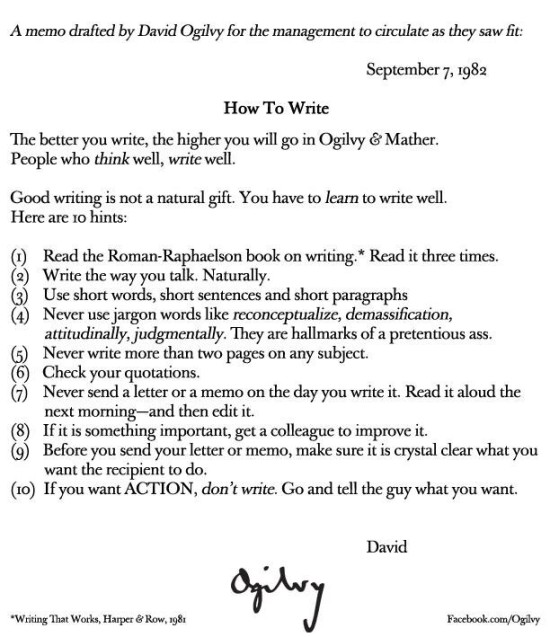How to Write in Economic Development
A masterclass in effective writing in just 10 bullet points.
Table of Contents
David Ogilvy was the real-life inspiration for the character Don Draper in the TV series Mad Men. He was the founder of advertising agency Ogilvy & Mather, and is still known, twenty years after his death, as the "Father of Advertising."
In 1982 he sent an internal memo to all of his employees. The memo was titled simply “How to Write.”
In just 10 bullet points he put together a masterclass on effective writing.

Here's a breakdown of each one:
0. Introduction
The memo starts with a clear why: "The better you write, the higher you will go in Ogilvy & Mather.
People who think well, write well.
Good writing is not a natural gift. You have to learn to write well.
Replace "Ogilvy & Mather" with your economic development organization, or any company, and this holds true.
1. Read the Roman-Raphelson book on writing. Read it three times.
This is the book: Writing That Works; How to Communicate Effectively In Business.
Every organization would be a better functioning place if this book was required reading before anyone was allowed to touch the company email.
If you are still sending emails with walls of text, order this.
2. Write the way you talk. Naturally.
"Finding your writing voice" is a waste of time.
You already have your voice - the one you use every day.
How to start using it in your writing?
• Choose a topic
• Record yourself talking about it
Then, transcribe it and start there.
3. Use short words, short sentences, and short paragraphs.
This one takes practice.
But the easiest way to find when you're being too wordy?
Read everything aloud before you publish it.
When you find yourself getting caught up, it's a sign you need to simplify.
4. Never use jargon words like "reconceptualizes, demassification, attitudinally, judgementally."
Here's how to think about jargon;
When you see someone using it, they're hiding their lack of understanding.
An easy solution: pretend you are writing to an 8th grader.
5. Never write more than two pages on any subject.
99% of books should be blog posts. And 99% of blog posts should be tweets.
I would preface this by saying: never publish more than two pages on any subject.
If it can't fit in two pages, it should be simpler.
6. Check your quotations.
This one is simple enough. Misquotes are unforced errors.
7. Never send a letter or memo on the day you write it. Read it aloud the next morning, then edit it.
This is the number one piece of writing advice I can give people.
If you are publishing something important, always, always, give it room to breathe.
And always read it aloud.
8. If it is something important, get a colleague to improve it.
This pairs nicely with point number 7. If it's something really important, write it, give it a day, edit it, then send it to a colleague.
9. Before you send your letter or memo, make sure it is crystal clear what you want the recipient to do.
So simple, but easy to forget.
Put yourself in the reader's shoes and identify exactly the next step they should take after reading.
Then, articulate those steps for them.
10. If you want ACTION, don't write. Go and tell the guy what you want.
Last and most importantly, writing is never a replacement for a targeted conversation.
In fact, most emails and messages should be direct conversations, especially ones that require action.
Econ Dev Show Newsletter
Join the newsletter to receive the latest updates in your inbox.


